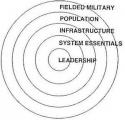wm makes an excellent practical point:
It follows along with what I looked at last night. I've not for a long time looked at the question of a conscientious objection to an otherwise lawful order. If we posit that the conscientious objection is genuinely held, then we have a clear collision between what is morally right (to that person) and what is legally right (to his or her superiors).The second tempest---whether the source of "the right" is the law or morality--is not so trivial. One can be right in many ways. But when it comes to conduct, we tend to narrow that down to two categories--doing what is morally right and doing what is legally right. However, let us not forget that some things that are morally right are nor necessarily legally right and vice versa. Whether the source of what is morally right is what is legally right is open to serious debate. Likewise with whether the origin of legal rectitude is moral rectitude. I happen to disagree with both positions but do not think this thread is the place to rehearse the reasons for that position. I will note that sometimes it happens that a given action is both legally and morally right (or wrong), but it may also be the case that a legally right action is morally wrong and vice versa.
The review of the professional ethic needs, in my opinion, to consider what is the basis of right and wrong in the formulation of the ethic. In other words, is the ethic based on law or is it based on morality. It may based on both. If so, then in those cases where the two sources may conflict, the ethic nees to specify which has primacy. If neither, then the ethic needs to expalin what other way(s) members of the military should resolve the conflict.
We also need to remember that right and wrong do not perfectly divide the world of judgments about actions. Actions may be morally/legally required, prohibited, and permitted. I think that judgments about right and wrong in the third category--permitted--are usually inappropriate. For example, were I walking down a dark street alone at night, I might decide to whistle. Unless I happen to live in some odd place where a law has been passed that forbids whistling, my choice is neither required nor forbidden, is neither right nor wrong. The review of the military ethic should try to make sure that it captures this threefold distinction and not stop with delineating just what the profession requires and forbids.
So, I hit the 2010 Criminal Law Deskbook, vol II, Crimes and Defenses, The Judge Advocate General’s School, US Army, Charlottesville, Virginia, Summer 2010 (Military Legal Resources).
In it, we find a number of citations which are unfavorable to the conscientious objector in refusing an otherwise lawful order:
pdf p. 66 -
8. Conscientious objection is not a defense to disobedience of lawful orders. United States v. Johnson, 45 M.J. 88 (C.A.A.F. 1996); United States v. Walker, 41 M.J. 462 (1995); United States v. Austin, 27 M.J. 227 (C.A.A.F. 1988).pdf p. 70 -
B. Disobedience. A superior’s order is presumed to be lawful and is disobeyed at the subordinate’s peril. To sustain the presumption, the order must relate to military duty, it must not conflict with the statutory or constitutional rights of the person receiving the order, and it must be a specific mandate to do or not to do a specific act. In sum, an order is presumed lawful if it has a valid military purpose and is a clear, specific, narrowly drawn mandate. United States v. Moore, 58 M.J. 466 (C.A.A.F. 2003). The dictates of a person’s conscience, religion, or personal philosophy cannot excuse disobedience. United States v. Stockman, 17 M.J. 530 (A.C.M.R. 1973).The most recent case cited in the Deskbook makes it very clear that legal right will prevail over moral right in the CO area:pdf p. 265 -
3. The processing of a conscientious objector application does not afford an accused a defense against his obligation to deploy, even if the orders to do so violate service regulations concerning conscientious objections. United States v. Johnson, 45 M.J. 88
(C.A.A.F. 1996).
Thus, creating a "safe harbor" for moral-ethical objections would require an extensive revision of the UCMJ and its underlying philosophy as to lawful orders. That could be done, but I've yet to see from any proponent (such as LTC Milburn) the legal provisions that would allow moral-ethical primacy.pdf p. 270 -
F. Religious Convictions. United States v. Webster, 65 M.J. 936 (A. Ct. Crim. App. 2008). The accused pled guilty to missing movement to Iraq by design and disobeying orders from two superior commissioned officers to deliver his bags for deployment. The accused had converted to Islam in 1994 and had doubts about whether he should participate in a war against Muslims. After consulting Islamic scholars on the Internet, the accused determined that the consensus was that Muslims are not permitted to participate in the war in Iraq. By participating as a combatant, the accused believed that he would be placed “in an unfavorable position on the Day of Judgment.” The accused filed a conscientious objector packet prior to the deployment, but withdrew it. He filed another conscientious objector packet on the same day that he missed movement. During the guilty plea inquiry, the military judge ruled that his religious beliefs would not provide a defense to disobeying orders. The ACCA first held that the accused’s guilty plea was knowing, voluntary, and provident. First, the accused confirmed that the defense of duress did not apply to him. Second, there is no authority for the proposition that conscientious objector status provides a defense for missing movement or violating lawful orders. Third, under AR 600-43, conscientious objector requests made after an individual has entered active duty will not be favorably considered when the objection is to a certain war, which was the case here. Finally, it is irrelevant that the offenses involving missing movement and failure to obey orders were based on religious motives where such motives and beliefs did not rise to the level of a duress defense and did not constitute any other defense. The court then held that the First Amendment does not require anything more to accommodate the accused’s free exercise of religion than was offered here, and the accused’s rights were not violated. The ACCA first identified the applicable standard for analyzing alleged government infringement on the free exercise of religion. Under the Religious Freedom Restoration Act of 1993, the state must have a “compelling state interest” before it can burden the free exercise of religion. Additionally, courts are enjoined to apply judicial deference when strictly scrutinizing the military’s burden on the free exercise of religion. See Goldman v. Weinberger, 475 U.S. 503 (1986). Applying these two standards, the ACCA concluded that the government had a compelling interest in requiring soldiers to deploy with their units. The government furthered this compelling interest using the least restrictive means. The Army offers soldiers an opportunity to apply for conscientious objector status, and in this case, his command offered the accused the opportunity to deploy in a non-combat role. In applying the duly required judicial deference, the ACCA concluded that the Army furthered its compelling interest in the least restrictive manner possible. The accused “had no legal right or privilege under the First Amendment to refuse obedience to the orders, and the orders were not given for an illegal purpose.” (citing United States v. Barry, 36 C.M.R. 829, 831 (C.G.B.R. 1966) (internal brackets omitted).
A similar (but even larger) problem exists if one asserts that "Just War Theory" (which one, of course) should prevail in the Laws of War (LOAC, IHL; both treaty and customary). That is so, especially in the rules governing the conduct of warfare (jus in bello); where the ICRC casebook, vol I, says:
This comment by LTC Milburn is simply wrong:Any past, present, and future theory of just war only concerns ius ad bellum and cannot justify (but is in fact frequently used to imply) that those fighting a just war have more rights or less obligations under IHL than those fighting an unjust war.
and frankly could mislead the non-expert reader. NOTThe United States and its allies are committed by treaty and policy to conduct military operations within the framework of just war theory.[14] Just war criteria fall into two categories: jus ad bellum, the reasons for going to war, and jus ad bello, the manner in which war is conducted.[15]
14. Just War theory is embodied in the United Nations Charter and the Law of War. Its intent is also reflected by the wording of the National Security Strategy.
15. Michael Walzer, Just and Unjust Wars (New York: Basic Books, 1977).
Regards
Mike
















Bookmarks